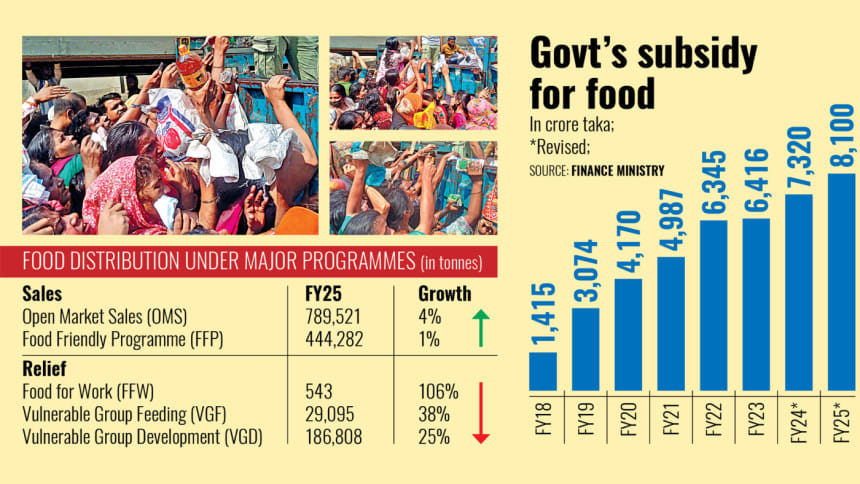

Last update on: Sun Mar 9, 2025 10:14 AM

The interim government is set to increase its allocation for food subsidies by nearly 12 percent, raising the total to Tk 8,100 crore, to intensify food distribution programmes and provide a cushion to low-income groups.
The move was prompted by production losses from two rounds of flash floods last year and persistent inflation, which has hovered above nine for 24 straight months.
For several months, food inflation had also remained in double digits, peaking at over 14 percent in July last year, before easing to just under 10 percent last month.
Against this backdrop, the Awami League government, which was ousted by a mass uprising in August last year, revised food subsidies upwards to Tk 7,250 crore in FY24.
Now, the interim government plans to raise the allocation further in a bid to build reserves and intervene in the market through subsidised sales and relief programmes, especially as hundreds are regularly queuing up in front of Open Market Sales (OMS) trucks, particularly in the capital.
The overall food grain stocks stood at 15.12 lakh tonnes as of March 5 of this fiscal year, including 10.82 lakh tonnes of rice.
The government did not meet its target to procure Aman rice that this year, as prices rose in the market and farmers were unwilling to supply to the state warehouses owing to fear of crop losses as a result of repeated floods.
Production of Aman season paddy, which accounts for the second-largest yield of rice crop, was estimated to be 3.58 lakh tonnes short of the target.
Similarly, Bangladesh’s production of Aus rice declined in FY25, with the finance ministry recently saying that Aus production fell short of the target by 9.55 lakh tonnes.
“The decision to increase subsidies is both rational and much anticipated,” said Jahangir Alam Khan, an agricultural economist.
“This initiative will provide a cushion for low-income groups in the face of persistent inflation,” he said.
Khan believes the move would have a positive impact on the market, with overall food distribution likely to increase.
Originally, the government allocated Tk 2,004 crore to the OMS programme under the food ministry and Trading Corporation of Bangladesh (TCB).
In the revised budget, this amount is likely to rise to nearly Tk 3,000 crore. Of this, the TCB under the commerce ministry will receive Tk 1,300 crore.
Although the TCB distribution was disrupted during the July-August period, the government stepped up the distribution of various goods, including potatoes and onions, thereafter.
At times, the TCB distributed vegetables as a special measure, according to finance ministry officials.
DISTRIBUTION DOWN SHARPLY
To support low-income groups, the government has expanded food distribution through the OMS, TCB and Food-Friendly Programme (FFP).
However, despite these measures, overall food distribution in the first eight months of FY25 declined by 1.70 lakh tonnes year-on-year to 18.16 lakh tonnes.
While distribution through the OMS and FFP has notably increased, most relief-related food programmes saw a downtick.
The government distributed 7.89 lakh tonnes of food grains under the OMS, up from 7.58 lakh tonnes the previous year, while the FFP distribution rose slightly to 4.44 lakh tonnes from 4.4 lakh tonnes.
However, food distribution under the Food for Work programme has fallen sharply, dropping from 1.07 lakh tonnes last fiscal year to only 543 tonnes this year.
Similarly, the Vulnerable Group Feeding (VGF) programme saw a 38 percent decline to 29,095 tonnes, while the Vulnerable Group Development (VGD) programme dropped by 25 percent to 1.86 lakh tonnes.
Regarding the decline in distribution, Khan explained, “Local administrative activities, led by ward members, councillors, and chairmen, were halted following the July uprising. As a result, food distribution has been significantly affected.”
FINANCE MINISTRY’S RECOMMENDATIONS
The finance ministry has recommended a set of measures to the government to ensure food security, emphasising fair prices for farmers, efficient supply chains, and strategic stock management of essential food items.
In a recent proposal, the ministry stressed the need to guarantee fair prices for genuine farmers to encourage higher agricultural production.
It also suggested developing an efficient system to deliver farm produce directly to consumers, drawing lessons from successful business models established through online platforms and social media.
The ministry further recommended conducting a comparative analysis of the annual demand for key food items, such as rice, lentils, oil, and potatoes, against current stock levels.
This would help project medium-term demand and formulate a comprehensive supply strategy.
To stabilise the market, the ministry proposed temporary tariff reductions or exemptions on essential agricultural products, including rice, potatoes, and onions, based on production trends.
Additionally, it called for the development of a robust supply framework for fertilisers and other key agricultural inputs to support farmers.
Enhancing storage capacity was also highlighted as a critical step.









